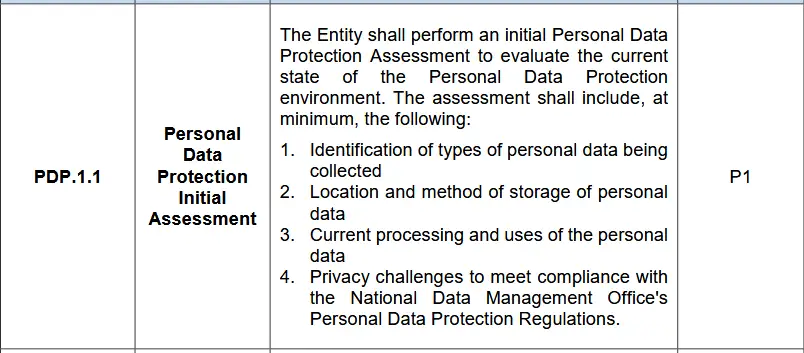
The Personal Data Protection (KSA NDMO PDP.1.1 – P1) Baseline Assessment is a comprehensive evaluation that an organization conducts to understand the current status of how personal data is handled, stored, and processed. This assessment helps identify gaps in the organization’s data protection practices, ensuring alignment with the National Data Management Office (NDMO) regulations. This Personal Data Protection Baseline Assessment serves as the foundation for building a robust data protection strategy, ensuring the entity remains compliant and secure in handling personal data.
General Activation Steps KSA NDMO PDP.1.1 – P1
Initiate the Assessment
- Establish a cross-functional team involving IT, legal, compliance, and data management personnel.
- Define the scope and objectives of the assessment.
Data Inventory and Mapping in KSA NDMO PDP.1.1 – P1
- Identify all personal data types collected by the entity.
- Document the data sources, methods of collection, and data flow within the organization.
- Map out where the data is stored (on-premises, cloud, third-party services, etc.).
Review Data Processing Activities
- Examine how personal data is processed and used across different departments.
- Identify any potential risks or challenges in processing that may affect compliance.
Assess Data Storage and Security
- Review the security measures in place for storing personal data.
- Evaluate encryption methods, access controls, and data masking techniques.
Evaluate Compliance Challenges
- Identify any privacy and compliance challenges related to the NDMO’s Personal Data Protection Regulations.
- Highlight areas where current practices may fall short of regulatory requirements.
Report and Action Plan KSA NDMO PDP.1.1 – P1
- Prepare a detailed report summarizing the findings of the assessment.
- Develop an action plan to address identified gaps, including timelines and responsible teams.
Use Cases
- Compliance Readiness: Organizations preparing for audits or regulatory reviews can use this assessment to ensure compliance with data protection laws.
- Risk Management: Entities aiming to identify and mitigate risks related to personal data breaches or unauthorized access.
- Data Governance Enhancement: Companies are looking to improve their overall data governance framework, especially in terms of personal data handling.
Dependencies
- Legal Frameworks: Understanding of the NDMO’s Personal Data Protection Regulations and other applicable laws.
- Data Management Maturity: The organization’s existing data governance and management capabilities.
- Technology Infrastructure: Availability of tools and systems for data inventory, encryption, and access control.
Tools and Technologies KSA NDMO PDP.1.1 – P1
- Data Inventory Tools: Informatica Data Catalog, Collibra, IBM InfoSphere.
- Data Mapping Software: Lucidchart, Microsoft Visio, Erwin Data Modeler.
- Data Security Solutions: Symantec Data Loss Prevention, Oracle Advanced Security, Microsoft Azure Security Center.
- Compliance Management Tools: OneTrust, TrustArc, LogicGate.
For Your Further Reading:
- KSA PDPL – Initial Framework
- KSA NDMO – Data Catalog and Metadata
- TOGAF – ADM (Architecture Development Method) vs. Enterprise Continuum
- KSA NDMO – DG Artifacts Control – Data Management Issue Tracking Register
- KSA NDMO – Classification Process – Data Classification Metadata
- Enterprise Architecture & Architecture Framework
- Enterprise Architecture Governance
- Data Security Standards
- Data Steward – Stewardship Activities
- Data Modeling – Metrics and Checklist
- How to Measure the Value of Data
- What is Content and Content Management?

